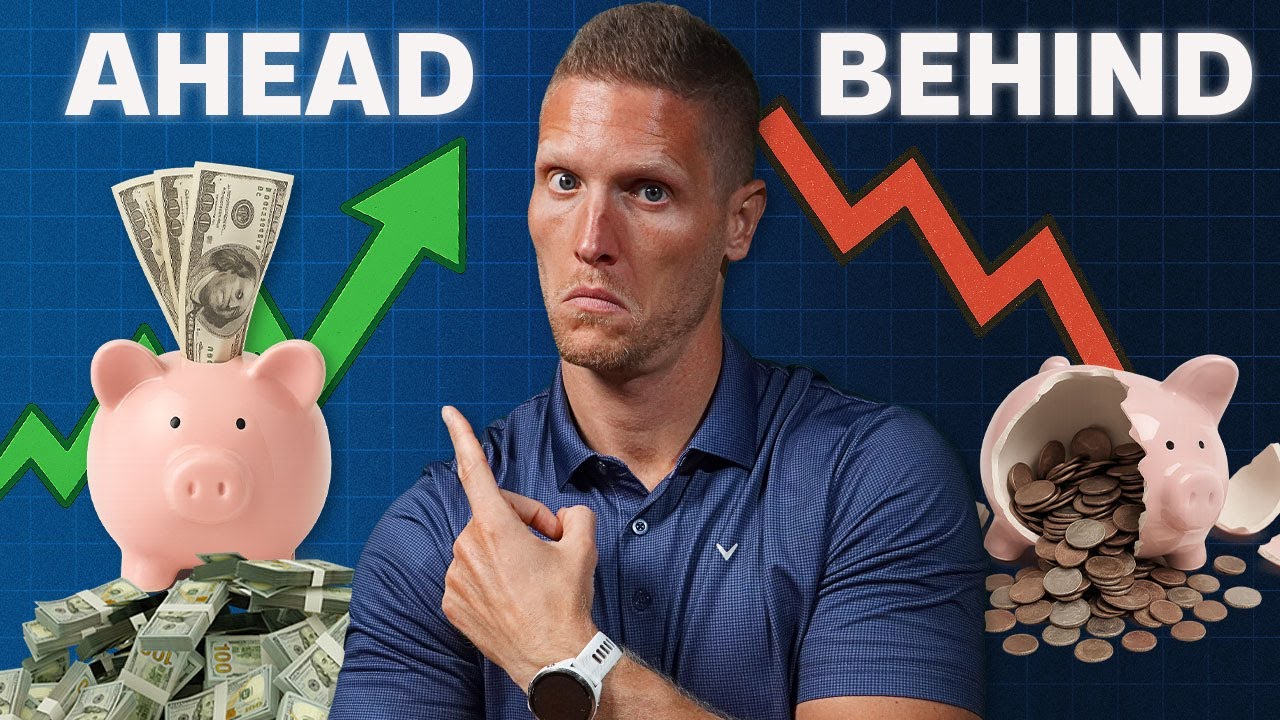All right, Bri, let’s talk about the 30s. We talk about this a lot on the show. This is the messy middle; this is where things get a little complicated because we have a thousand different things pulling us in a thousand different directions. It seems like we don’t really have time for anything because we have to find time to make time for everything.
We say the days are long and the years are short because not only are you feeling like you’re short on money because there are definitely a lot of things pulling at your back pocket and your purse, but you’re also short on time because you’ve got all these commitments, not only with your job but your community as well as your family. There’s a lot of stuff that makes the 30s that messy middle.
So how do we attack this? Yes, as you’re thinking about the financial planning pyramid and your cash flow and spending, one thing you have to keep in your mind is that it’s likely you were in a different income situation in your 30s than you were in your 20s. You want to make sure that your savings rate also matches that. Don’t be a person with a 30-year-old’s income but a 20-year-old’s savings rate. That’s not where you need to be. As you have pay raises, promotions, and circumstances change, make sure that your savings rate is also maturing with you.
It makes me sad when I find out somebody got into the behavior of maxing out their Roth IRA when they were, say, 25, 26, and then they get into their 30s. They’ve had five pay raises since then, and their only version of investing is still maxing out their Roth. You don’t invest like you did when you were in your 20s. Keep progressing, changing, and updating to reflect your life. That’s why we always talk about the savings rate, and we’ll get into what that means for investing, but focus on that and avoid lifestyle creep.
You have to avoid looking out for those lifestyle creeps because they’re going to show up in your 30s. The Joneses are going to be right around the corner, and you want to make sure you’re not falling into the trap because in your 20s, you could have mistakes that happen by the tens of dollars or the hundreds of dollars. But as you get into your 30s, now the oops happen by the thousands, and they can have a meaningful impact on your financial life. So don’t let your life start creeping away from you. Unfortunately, we see far too many people that this happens to.
There are some big expenses, housing being one of them, and it’s such a hard time right now. So don’t be mad, but this is a unique time where maybe renting is better than owning in certain markets and communities. You can evaluate that. We even give you a checklist at money.com/resources. We have a housing checklist because what you’re trying to overcome is all this inflation, all these things that ran housing up. How do you mitigate that, and how do you make sure you’re making the right decision for your household?
The house is probably the most expensive thing you’re going to spend money on. The car is probably the second most expensive thing you’re likely to spend money on, and we see so many people making bad decisions when it comes to their automobiles. Listen to these statistics: the average auto loan term for a new car right now is 68 months—that’s incredible. The average amount financed on a new car has risen to over $41,000, and the average amount of negative equity that’s rolled into automobile purchases is over $6,000.
Bri, that is a far cry from the rule that we tell people when it comes to buying a car. What’s the right way to do it? Well, we talk about 20/3/8. That’s where you’re putting 20% down, you don’t finance longer than three years, and you make sure your monthly payments don’t exceed 8% of your gross income.
Here’s what I think is so sad: I even saw this on Twitter where people who are putting out there that they’re somewhat successful, you know, you look at their Twitter handle and see what they do for a living, and it has all this razzle-dazzle to it. Then they’re asking questions where they have like $188,000 of negative equity. You’re like, “Well, maybe that’s just the one-off,” but then you find out in the stat of how much financing is out there that the typical car that’s traded in right now has over $6,000 of negative equity.
Guys, quit faking it. Nobody cares what car you’re driving. When we talk about 20/3/8, this is Toyota, this is Corolla. We’re not talking about the Land Cruisers. We’re talking about the Honda Civics, the Corollas, and those that you need transportation that reliably gets you to your job. This is not something to flex on, and that’s the part that I struggle with: people making those big decisions in your 20s that were $100-a-month mistakes. Now they can be thousands of dollars of mistakes. Don’t fall into it because you’re stealing from your future self.
It’s interesting, Brian, you say the job, and that’s another thing you ought to be thinking about in your 30s. Do I just have a job I clock in and clock out of, or am I actually working towards a career? Am I in a vocation, am I in a field that’s going to set me up to continue to be able to advance, or is this just a job?
I would argue that by your 30s, you should begin starting to have some clarity around what your career should look like. But again, Brian, I think a lot of folks don’t have that. Yeah, there’s a lot you can tell because the stats show it: 58% of Americans are planning a major job change, and only 33% of workers are satisfied with their opportunities for promotion. That shows that a lot of us are on Sunday chewing our fingernails or having a lot of anxiety about this.
Guys, take an inventory of where you are because we spend so much time with our work family. Make sure that the job is actually a career because you’re now in that second decade out to where it needs to align with your long-term objectives and even your happiness. Don’t just take that for granted.
We talk about this all the time, specifically when it comes to compounding and savings, but we always say that wasting time is way more expensive than wasting money. Well, that’s even true in your career field. What you don’t want to do is wake up at 40, wake up at 45, and say, “Man, I wish I would have made a change. I wish I would have pursued, I wish I would have gone back.” If you are in that place right now, start figuring out what things you need to change, what pieces you need to move around in your life so that you can begin living the life that you actually want to be living.
Don’t let time pass you by and wake up 10 years from now with regrets. I still think this is a young decade, your 30s. A lot of exciting stuff, but you shouldn’t just skip risk management because here’s why this is super important. More than likely, in your 30s, someone out there is dependent upon you or counting on you, whether it’s your income or whether it’s what you do for them. Make sure you’re not skipping out on life insurance and disability insurance. This is an important decade because people are counting on you.
The other thing you have to make sure, and for that same reason, is that you do have a fully funded emergency fund where you could probably get away with fudging it a little bit in your 20s. In your 30s, you can’t fudge it because if something bad happens to you, if that emergency happens, that job loss happens, that car repair happens, whatever that thing is that happens, you want to make sure it does not derail you and derail the folks that are depending on you. So in your 30s, I’m going to argue it’s non-negotiable.
Then I’ll close out the risk management with umbrella insurance. You’re like, “What’s umbrella insurance?” because I don’t think a lot of 20-somethings are out there talking about umbrella insurance on Reddit and so forth. But once you get into your 30s and you have houses or a house, umbrella insurance, just like the visual kind of plays itself out, sits on top of whatever coverage you have from your homeowner’s policy or automobile policy. That umbrella is going to give you additional protection, and it’s pretty cheap. I always tell people, “Look at what your net worth is; see if you can ensure that” because it takes the target down a little bit or protects you as your target gets bigger as your wealth grows.
Now, we talked about how the emergency fund is sort of a non-negotiable in the 30s because it’s so important. I’m going to argue there’s another non-negotiable that starts to happen in your 30s, and that’s investing 20 to 25% of your gross income. We say that’s the amount you should be saving to be able to work towards financial independence. Well, it’s hard to do in your 20s. You already said in your 20s you’re broke, and you don’t have a ton of money. In your 30s, you need to be working towards that goal because if you can start investing 20 to 25%, you are going to be able to control what your future looks like.
If you continue to wait and let time move by without taking saving and investing seriously, it’s going to be really hard for you to catch up in the later decade. Don’t get distracted by the kids. In your 30s, you’re likely going to have a child, and it’s in that decade where you’re going to see this. Don’t let that distract you from saving and investing for your future. You’re also likely going to want to start saving for college, but don’t let that distract you. Keep your eye on the prize.
A lot of what we’re talking about here is just knowing yourself and knowing what it is you ultimately want to work towards and who it is you ultimately want to be. That’s going to give you the ability to begin focusing on things that are important to you and prioritizing the things that matter.
Becoming a parent in your 30s, you realize you don’t have a lot of time. Time becomes more valuable because you are starting to have kids and thinking about your future. Everything just starts feeling more valuable. So being efficient with your time, your resources, and what you’re doing is key because you are juggling a lot in this decade. That’s the beautiful thing about it, and why we talk about it all the time, is that you can do it. We’ve seen so many people. We share so many case studies of people who just went through this decade and beyond.













